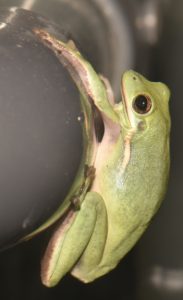
Julian K.A. Langowski
Julian K.A. Langowski is a postdoctoral researcher at the Experimental Zoology Group at the Animal Sciences Group at Wageningen University & Research (WUR).
Julian is a science chameleon that enjoys solving complex problems at the interface between life and engineering sciences. He believes in fundamental biological research as basis for the development of biomimetic applications, and that biologists and engineers can benefit a lot from each other. Therefore, he strives for a synergistic combination of biological and engineering approaches to obtain novel insights into the functioning of complex biological systems, and to study the biomimetic potential thereof.

For his Ph.D. thesis entitled Getting a grip on tree frog attachment: Mechanisms, structures, and biomimetic potential at the Experimental Zoology Group, Julian focused from 2015 onwards on the attachment of the wet soft adhesive toes of tree frogs. In the interdisciplinary research project Secure and gentle grip of delicate biological tissues (funded by NWO-TTP), he studied the fundamentals of tree frog attachment in order to advance—in collaboration with scientists from Biomechanical Engineering at TU Delft—the development of soft gripping tools that function in a wet environment. Julian established international collaborations with Functional Morphology and Biomechanics at Kiel University, Germany, and the Prof. Ali Dhinojwala Research Group at The University of Akron, United States, to study the attachment of tree frogs in a comprehensive, interdisciplinary approach. Awarded with several travel grants, he presented his research at various international conferences (e.g. European Network of Bioadhesion Expertise, Society for Experimental Biology, and Gordon research conference: Science of adhesion). Julian published all research chapters of his thesis in peer-reviewed, renowned (Q1) journals, and defended his thesis with the distinction cum laude.
Since 2019, Julian works as postdoctoral researcher within the 4TU project Soft Robotics. He looks forward to explore the fundamentals of gripping in biological systems (e.g. the sticky toes of tree frogs and the soft muscular arms of cuttlefish), and to stimulate the development of state-of-the-art soft grippers, for example for handling delicate agricultural products. His research interests include: (1) Attachment in challenging environments, (2) fundamental physics, chemistry, and mechanics of bioadhesion, (3) neuromechanics of attachment, and (4) the functional embedding of soft adhesives in biological and technical systems.




